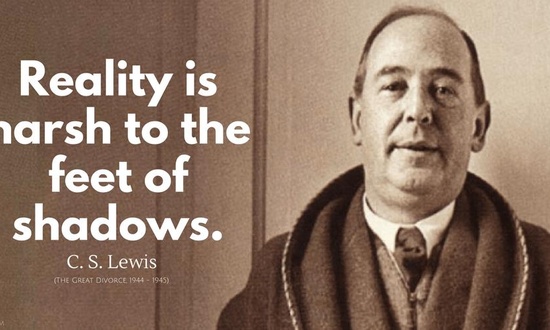I had the privilege of attending and speaking at Desiring God’s 2013 National Conference. It was profoundly Christ-centered, both in the worship and teaching. One of the great things that came of that conference was the book The Romantic Rationalist: God, Life, and Imagination in the Work of C. S. Lewis. I contributed a chapter on Lewis’s view of Heaven and an appendix on his view of Hell, both dealing with a lot of Scripture.
Here’s an excerpt from my chapter, “C. S. Lewis on Heaven and the New Earth: God’s Eternal Remedy to the Problem of Evil and Suffering.” (You can also watch the entire message this chapter was taken from.)
There is much to look forward to about being with Christ in the present Heaven. As Paul put it, “To be absent from the body is to be present with the Lord” (1 Corinthians 5:4).
Lewis wrote to a believing American woman who thought she was dying:
“Can you not see death as a friend and deliverer? . . . What is there to be afraid of? . . .Your sins are confessed. . . . Has this world been so kind to you that you should leave with regret? There are better things ahead than any we leave behind. . . . Our Lord says to you, ‘Peace, child, peace. Relax. Let go. I will catch you.’" [i]
Lewis added, “Of course, this may not be the end. Then make it a good rehearsal.” He signed the letter, “Yours (and like you, a tired traveler, near the journey’s end).” Five months later, he died.
Colossians 3 commands us to think about the present Heaven, where Christ is seated at God’s right hand. But Scripture is also clear that the Heaven that should most dominate our thinking is the eternal kingdom of God, the climactic culmination of God’s unfolding drama of redemption.
“But in keeping with his promise we are looking forward to a new heaven and a new earth, where righteousness dwells” (2 Peter 3:13, NIV). But how can we look forward to it if we don’t think about it? And how can we think about it unless we are taught about it from God’s Word? Suppose a trip awaits you and you will be flying from Miami to Santa Barbara, with a layover in Dallas, Dallas is not your final destination. You say, “I’m headed to Santa Barbara.” Or at most you say, “I’m headed to Santa Barbara by way of Dallas.” According to Scripture, the New Earth is our final destination. The present Heaven will be a stop along the way toward resurrection. (It’ll be a wonderful layover. In Philippians 1:21 Paul calls it “better by far” than our present existence; infinitely better than the Dallas airport!)
Revelation 21 beautifully portrays what awaits God’s children:
Then I saw a new heaven and a new earth, for the first heaven and the first earth had passed away…I saw the holy city, new Jerusalem, coming down out of heaven from God…And I heard a loud voice from the throne saying, “Behold, the dwelling place of God is with man. He will dwell with them, and they will be his people, and God himself will be with them as their God. He will wipe away every tear from their eyes, and death shall be no more, neither shall there be mourning, nor crying, nor pain anymore, for the former things have passed away.”
Multiple times in this passage God says he will come down from the present heaven to live with his people on the New Earth. The city “comes down out of heaven,” God’s dwelling place is “with man,” God will “dwell with them,” and God himself “will be with them.” Despite the repetition, most Christians still don’t appear to believe that God’s plan is to bring Heaven to Earth and dwell here with us forever. Not just for a thousand years in a millennial kingdom on the old earth, but forever on the New Earth. Christ is Emmanuel, “God with us”, forever. The incarnation of Jesus was not temporary.
We normally think of us going up to Heaven to live with God in his place. That is indeed what happens when we die. But the ultimate promise is that God will come down to live with us in our place, on the New Earth. The ultimate Heaven will not be “us with God” but “God with us” (Revelation 21:3).
 I love Lewis’s valiant mouse, Reepicheep, who single-mindedly sought Aslan’s country: “While I can, I sail east in the Dawn Treader. When she fails me, I paddle east in my coracle. When she sinks, I shall swim east with my four paws. And when I can swim no longer, if I have not reached Aslan’s country, or shot over the edge of the world in some vast cataract, I shall sink with my nose to the sunrise." [ii]
I love Lewis’s valiant mouse, Reepicheep, who single-mindedly sought Aslan’s country: “While I can, I sail east in the Dawn Treader. When she fails me, I paddle east in my coracle. When she sinks, I shall swim east with my four paws. And when I can swim no longer, if I have not reached Aslan’s country, or shot over the edge of the world in some vast cataract, I shall sink with my nose to the sunrise." [ii]
Reepicheep doesn’t long for Aslan’s “Ghostly Realm of Cloudy Nothingness”. He longs to be with his King forever in that solid country with land, mountains, rivers, metals, plains, trees, animals and people with physical bodies. The ground quakes under Aslan as he prowls. Aslan is real and tangible, and his flowing mane can be touched if you dare. Reepicheep loves Aslan not as a disembodied spirit but as a tangible mighty Lion, King of Kings, ruler of Narnia, Earth and all worlds. Reepicheep longs to be in Aslan’s country, for he longs for Aslan himself.
We want Jesus, so naturally we should want to live where he lives!Hebrews 11:16 says, “they were longing for a better country—a heavenly one.” The patriarchs longed for a better country because they longed for God. The reason Heaven matters is because God lives there.
In Mere Christianity Lewis lamented that we haven’t been trained to want Heaven:
Our whole education tends to fix our minds on this world. …when the real want for Heaven is present in us, we do not recognize it. Most people, if they had really learned to look into their own hearts, would know that they do want, and want acutely, something that cannot be had in this world. There are all sorts of things in this world that offer to give it to you, but they never quite keep their promise…If we find ourselves with a desire that nothing in this world can satisfy, the most probable explanation is that we were made for another world. [iii]
[i] C. S. Lewis, Letters to an American Lady (Grand Rapids, MI: Eerdmans, 1967), 117.
[ii] C. S. Lewis, The Voyage of the Dawn Treader (New York: Scholastic, 1952), 24.
[iii] C. S. Lewis, Mere Christianity (New York: Macmillan, 1960), 119.




